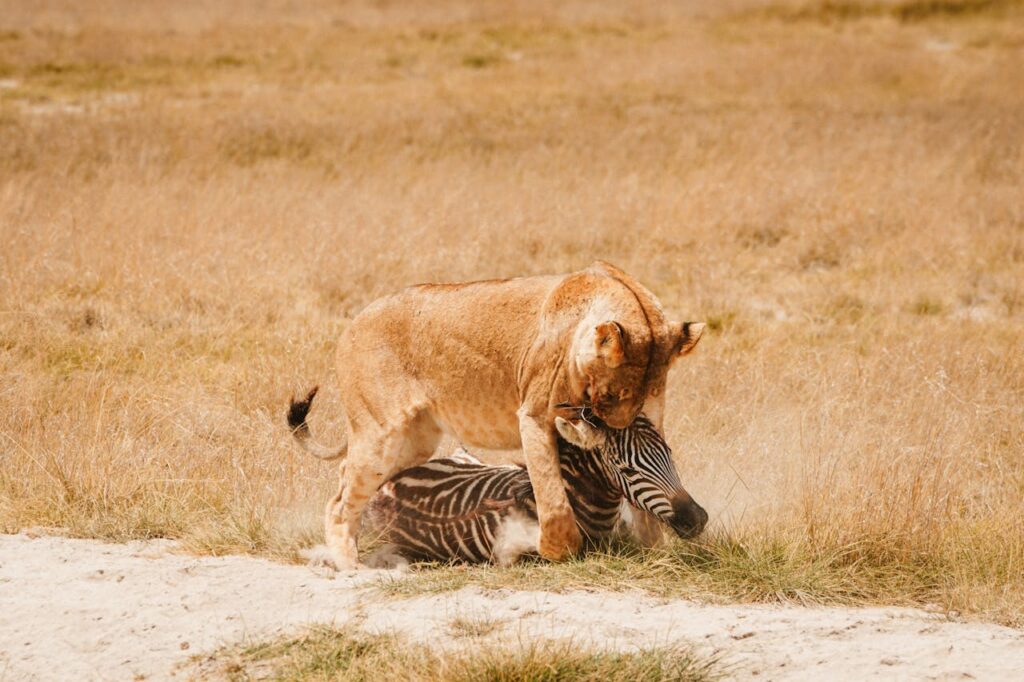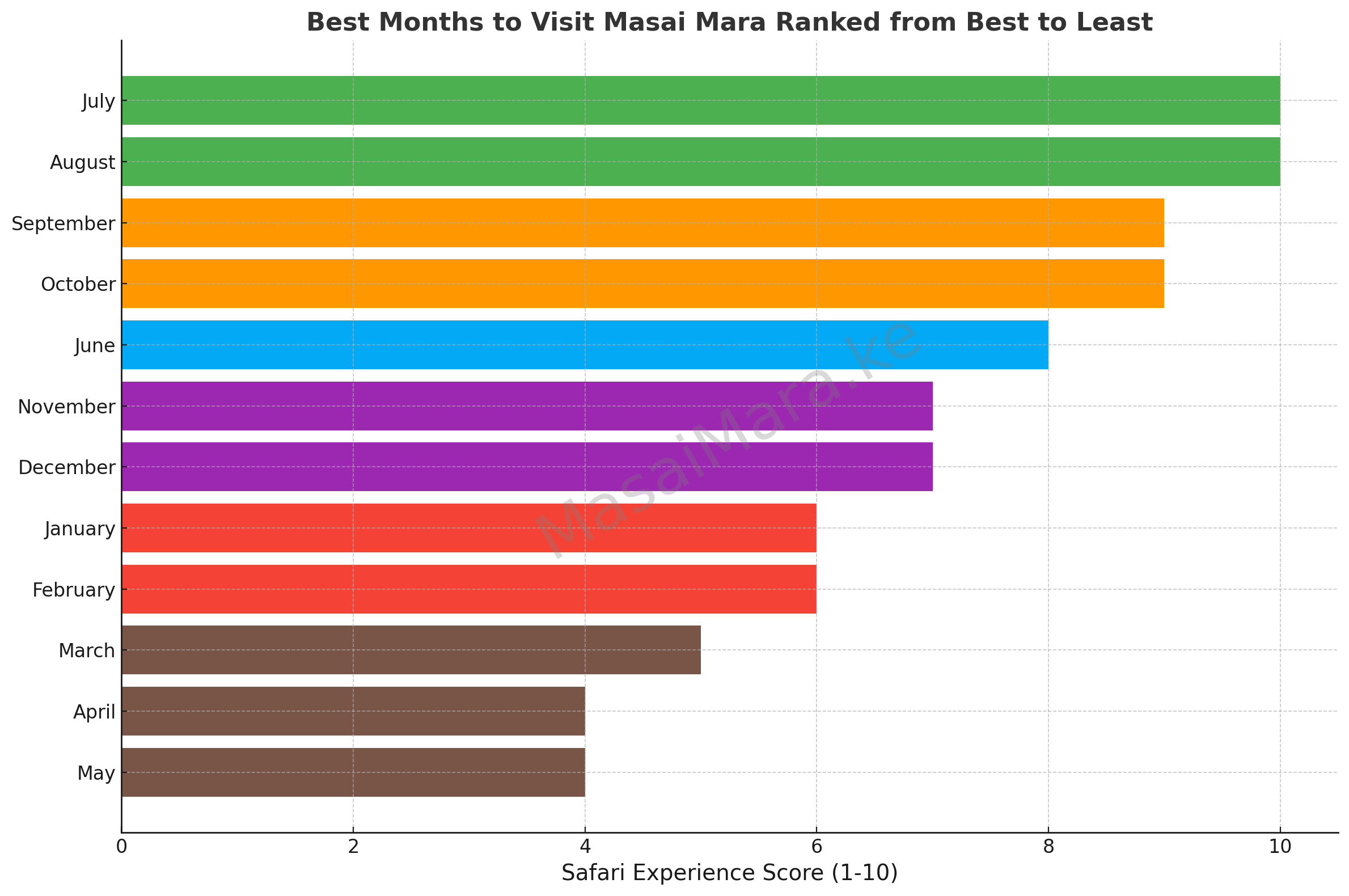Lions typically do not attack safari vehicles when on game drives due to a combination of factors rooted in their perception of the vehicle and its surroundings. Studies indicate that lions perceive the vehicle as a single, large, non-threatening entity rather than focusing on the individual people inside it. According to research on predator behavior, lions often see safari vehicles as a part of the landscape, which does not elicit a predatory response.
Additionally, as shown in studies published in the Journal of Animal Ecology, large carnivores, including lions, have evolved to avoid direct interactions with humans, viewing humans as a potential risk rather than prey. This evolutionary avoidance behavior is reinforced when vehicles consistently maintain a non-aggressive presence, allowing lions to become habituated to them without associating them with danger or food.
5 Reasons Why Lions Don’t Attack Safari Vehicles
1. Perception of Vehicles as a Single, Solid Entity
Lions don’t typically attack safari vehicles because they perceive the vehicle and its occupants as one large, solid object rather than distinct, moving individuals. This perceptual phenomenon is rooted in how neural systems process visual information in animals.
A study on visual cortex neurons in monkeys and cats by Geisler and Albrecht (1997) found that neurons in the brain are finely tuned to detect and discriminate between objects based on contrast, spatial position, and orientation. The responses of single neurons in these animals’ visual systems allow them to make precise decisions about the size, location, and movement of objects in their environment.
For lions, similar neural mechanisms likely categorize a safari vehicle as a large, unthreatening entity rather than potential prey. As long as the vehicle behaves predictably and does not break the lions’ sense of its “oneness,” they don’t perceive it as something to attack. This is similar to how individual cortical neurons in monkeys and cats respond to visual stimuli, reliably signaling features like size and orientation that help the brain classify objects.
This neural processing allows lions to overlook humans in safari vehicles as potential threats or prey, so long as the vehicle remains a static and cohesive visual object.
2. Lions’ Fear and Avoidance of Humans
Lions generally don’t attack safari vehicles due to a combination of factors related to their perception of the vehicle, their natural behavior towards humans, and their evolutionary instincts. Research shows that large predators, including lions, tend to avoid direct confrontations with humans, often perceiving us as a potential threat rather than prey.
A study published in the Journal of Animal Ecology (Barker et al., 2023) highlights that large carnivores, such as lions, prioritize avoiding humans as part of a survival strategy that has evolved over millennia. Lions may perceive humans as dangerous, leading them to keep their distance, even when humans are nearby in vehicles.
3. Predictability and Habituation
Another factor is the predictability of safari vehicles. Lions, along with other wildlife, are highly observant of their surroundings. Safari vehicles operate in a predictable manner—moving slowly, following set paths, and not emitting sudden threats.
Over time, lions habituate to the presence of vehicles, learning that they pose no harm. In areas like Kenya’s Maasai Mara Park or South Africa’s Kruger National Park, where safari vehicles are common, lions are accustomed to their presence, leading to a lack of interest in engaging with them.
Wildlife expert Dr. Craig Packer, a renowned lion researcher, points out that lions have a low tolerance for human behavior that is out of the ordinary. However, since safari vehicles remain predictable, silent, and consistent, lions are generally indifferent to them.
4. Non-Confrontational Behavior of Safari Vehicles
Safari guides are trained to follow specific protocols when approaching wildlife, particularly lions. This includes maintaining a respectful distance, keeping noise levels low, and not interfering with the animals.
Such non-confrontational behavior further ensures that lions don’t feel threatened or provoked. If vehicles were to drive erratically or approach too closely, it could provoke a defensive response, but most guides are skilled in reading animal body language and adjusting behavior accordingly.
5. Risk Aversion in Large Predators
Predators like lions exhibit risk-averse behavior in many instances. They tend to avoid unnecessary confrontations with unfamiliar objects, particularly when the object in question (a vehicle) is significantly larger than they are. Studies from other wildlife behavior experts suggest that even apex predators tend to calculate risks carefully, and if an entity appears too large or non-prey-like, they avoid engaging with it.
Do Lions Attack Humans?
Yes, lions can and do occasionally attack humans on foot, though such attacks are relatively rare. Most lion attacks occur when lions feel threatened, cornered, or provoked, or in situations where food scarcity makes them more likely to engage in risky behavior. Several studies and reports provide insights into the circumstances that lead to lion attacks on humans.
According to Statista, lions are the 12th deadliest animals killing about 250 humans anually.

Find more statistics at Statista
A study published in Nature Communications found that lion attacks on humans tend to spike in rural areas during periods of prey scarcity or during the wet season when their natural prey is more dispersed. This can drive lions to seek alternative food sources, including humans, especially in areas where humans and wildlife share the same habitat.
Another significant source of data on lion attacks comes from research conducted in Tanzania, which reports that most fatal lion attacks occur during the evening or night, particularly when people are walking near or through lion territories. Many of these incidents are linked to agricultural activities, where humans move close to lion habitats after sunset or in the early morning hours.
Additionally, research published in the Journal of Zoology emphasizes that in certain cases, lions that have been injured or are unable to hunt their natural prey may turn to attacking humans. In some rare instances, lions have been classified as “man-eaters,” often when old or incapacitated lions no longer have the ability to catch quicker prey and find humans to be an easier target.
However, it’s important to note that healthy lions typically avoid humans, and attacks are not part of their regular predatory behavior. Lions’ evolutionary avoidance of humans, as mentioned in the Journal of Animal Ecology, remains a strong factor, limiting the number of attacks compared to other large predators.
Lions Can Attack when Provoked;
Lions, being highly territorial and powerful predators, can become aggressive and attack if provoked. Though they may appear calm or indifferent when spotted during safaris or wildlife tours, their behavior can quickly shift when they feel threatened, intruded upon, or challenged. Provocation can come in various forms, including getting too close to them, making sudden movements, or even staying in their territory for too long.
During mating season or when protecting their cubs, lions are especially on high alert and more prone to react aggressively. While they often give warning signs like growling or mock charging, these signals can quickly escalate into full-blown attacks if ignored. It is crucial for tourists and safari-goers to maintain a safe distance, follow guides’ instructions, and avoid actions that might trigger a lion’s defensive instincts to prevent potentially life-threatening encounters.
See the clips in the video below showing lions charging when provoked;
https://www.youtube.com/watch?v=EhqhfDZFOvQ&ab_channel=Claws
Which Safari vehicle is safe to avoid lion attacks?
When considering safety from potential lion encounters during a safari, a closed-body Land Cruiser is generally safer than its open-sided counterpart. Closed-body Land Cruisers provide a protective barrier between passengers and wildlife, making it difficult for lions to physically access those inside.
In contrast, open-sided safari vehicles, while offering better views for game watching, leave passengers more exposed, particularly when only canvas windows are used. According to wildlife experts, lions typically do not attack vehicles, but in rare instances of heightened curiosity or aggression, the solid structure of a closed-body Land Cruiser offers added security. This reinforced enclosure not only prevents direct contact but also maintains a sense of the vehicle as a single, non-threatening entity, further reducing the likelihood of a lion engaging with it.
For safaris in areas with larger and more curious predators, a closed-body vehicle is advisable for greater peace of mind and protection.
6 Tips to be safe in a safari vehicle
When on a safari, especially in vehicles like open- or closed-sided Land Cruisers, following expert safety tips is critical to avoid potential lion attacks. Here are key recommendations:
- Stay Inside the Vehicle: Whether in an open-sided or closed-body Land Cruiser, always remain inside the vehicle. Lions typically perceive the vehicle and its passengers as a single, non-threatening entity. Standing up or leaning out can break this illusion, attracting unwanted attention.
- Avoid Sudden Movements: In open-sided vehicles, be particularly cautious of making sudden movements, which may trigger a predator’s curiosity or hunting instincts. Keeping still helps maintain the perception of the vehicle as a non-prey object.
- Keep Calm and Quiet: Noise can draw attention from lions, especially in open-sided vehicles. Speak softly and avoid loud noises or unnecessary commotion to prevent startling wildlife.
- Respect Their Space: Lions are territorial animals. Safari guides will often know how far to maintain distance, but in an open-sided Land Cruiser, staying farther away is a good precaution. If a lion approaches, it is critical to remain calm and still.
- Follow the Guide’s Instructions: Whether in an open or closed vehicle, always follow the advice of your safari guide, who is trained in managing wildlife encounters. Guides know when it’s safe to observe and when to move away from a pride or a lone lion.
- Time of Day Matters: Lions are generally more active during early mornings and late afternoons. If using open-sided vehicles during these times, be especially vigilant and ensure to follow all safety guidelines.
By adhering to these safety tips, the risks of an encounter with lions can be minimized, ensuring a safer and more enjoyable safari experience.
FAQs on Lion Attacks on Humans in Safaris
Here are some common FAQs about lion attacks on safari vehicles, along with expert responses:
1. Have lions ever attacked safari vehicles?
While rare, there have been isolated reports of lions showing aggression toward safari vehicles. These cases are uncommon and usually occur when lions feel threatened or are provoked, such as through sudden movement or noise from people inside the vehicle. Most lions view the vehicle as a non-threatening, solid entity.
2. Are open-sided safari vehicles more dangerous than closed vehicles?
Open-sided safari vehicles may increase the feeling of exposure, but attacks on them are still extremely rare. However, closed vehicles are generally safer because they offer a physical barrier between the passengers and the wildlife, reducing the risk of contact in the event of unusual behavior from a lion.
3. What should I do if a lion approaches the safari vehicle?
If a lion approaches the vehicle, stay calm, remain seated, and avoid making sudden movements or noises. Do not attempt to stand up or lean out of the vehicle. Lions typically show curiosity rather than aggression if you remain still. Your safari guide is trained to handle these situations and will likely instruct the driver to move if needed.
4. Why do lions usually ignore safari vehicles?
Lions often perceive safari vehicles as a single, large, and non-threatening object. Research, such as the studies on predator behavior in human-dominated areas, suggests that large predators like lions avoid conflict with humans and do not view safari vehicles as prey or a threat unless provoked .
5. Do nighttime safaris increase the risk of lion attacks?
Lions are nocturnal hunters and are more active at night, but attacks on safari vehicles are still rare during nighttime drives. Most safari vehicles use spotlights, and guides are experienced in reading lion behavior to ensure safety. Following the guide’s instructions and maintaining a respectful distance at night is critical.
6. Are there more risks during mating season or when cubs are present?
Lions can become more protective and aggressive when guarding cubs or during mating season. While they are unlikely to attack a safari vehicle, being cautious and maintaining a distance from prides with cubs or mating lions is essential. Safari guides are well-versed in recognizing these heightened risk factors and will adjust the approach accordingly.
7. Is it safe to take photos when lions are close?
Taking photos is generally safe, but avoid sudden movements and loud camera noises, as these could startle lions or disrupt their behavior. Keep movements subtle and ensure your camera’s sound is minimized. Be mindful of your guide’s instructions, as they are trained to assess the situation and can advise when it’s best to hold off on photos.
8. Can lions jump into an open safari vehicle?
While lions have the ability to jump into open vehicles, they rarely do so. Lions typically see safari vehicles as a whole, non-threatening object, and unless provoked or startled, they won’t show aggression toward people in the vehicle. Avoid standing or leaning out of open vehicles, as these actions may break the vehicle’s silhouette and trigger curiosity or aggression from lions.
9. What should I wear on a lion safari?
It’s best to wear neutral-colored clothing, such as beige, khaki, or olive green, to blend into the surroundings and avoid attracting attention from lions. Bright colors or white may stand out to lions, while dark colors can retain heat, making the safari less comfortable.
10. What if a lion charges the vehicle?
Lion charges are usually mock charges, intended to warn rather than attack. If a lion charges the vehicle, remain calm and trust your guide to handle the situation. Safari guides are experienced in reading lion behavior and will likely instruct the driver to move away slowly. Quick movements or loud noises from passengers could escalate the situation, so it’s essential to stay composed.
11. Can lions smell humans in safari vehicles?
Yes, lions can smell humans, but they typically don’t perceive people inside vehicles as prey. The vehicle acts as a barrier, and lions do not generally associate the scent of humans with danger unless they are already conditioned to fear humans on foot.
12. Can making eye contact with a lion provoke an attack?
Direct eye contact can be interpreted as a threat in many animals, including lions. However, from within a vehicle, lions are less likely to interpret eye contact as provocative because they perceive the vehicle and its occupants as a single, non-threatening entity. Avoid leaning out or making sudden movements while maintaining eye contact.
13. Is there a higher risk of attack if lions are hunting nearby?
Lions are less likely to show aggression toward vehicles even when hunting, as their focus is on the prey. However, it’s essential to keep a respectful distance, especially when lions are stalking or feeding, as they may become protective of their food. Your guide will ensure you are positioned at a safe distance during such encounters.


